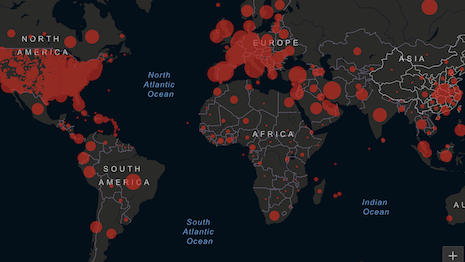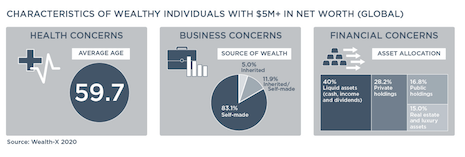- About
- Subscribe Now
- New York,
April 14, 2020

 COVID-19 global cases. Image credit: John Hopkins University
COVID-19 global cases. Image credit: John Hopkins University
As wealthy individuals see their portfolios contract from the COVID-19-related recession, some are scaling back on purchases.
Market researcher Wealth-X recommends that luxury brands focus their marketing efforts on nurturing loyal customers who will be most likely to support them during this time and after the crisis subsides. The recommendation is one of many in a new Wealth-X report called "COVID-19’s Impact on the Wealthy: Best Practices for Engagement During a Global Crisis."
“The ongoing coronavirus pandemic is being accompanied by huge human toll – and an increasingly large economic downturn as large swathes of the global economy become unviable,” said Maya Imberg, senior director of thought leadership and analytics at Wealth-X, New York, in the report.
 Characteristics of wealthy individuals with $5M+ in net worth. Image credit: Wealth-X
Characteristics of wealthy individuals with $5M+ in net worth. Image credit: Wealth-X
Health and economic concerns
Wealthy individuals are not only concerned about the health of themselves and their loved ones. Many own and operate businesses and are concerned about the impact of the disease on their employees and the health of their companies.
Many of these companies are seeing their stock values drop and this is resonating in business decisions. While some companies are able to cover the costs of business shutting down, others have had to lay off employees or at least furlough them until the pandemic ends.
Both very-high-net-worth (VHNW) and ultra-high-net-worth (UHNW) individuals have suffered the economic fallout from the virus.
“Most will have seen their wealth reduce, with many businesses struggling and stock markets across the world having nosedived,” Ms. Imberg said in the report. “And for those holding liquid assets (such as cash) in their local currency, many have seen this asset weaken substantially against the U.S. dollar – a small silver lining for the wealthy in the U.S. or those with reserves in U.S. dollars.
“Yet the fate of these individuals’ personal wealth will depend much on how governments and health authorities deal with the path of the pandemic, and also what the economic recovery looks like once we are through the worst,” she said.
 Maya Imberg is senior director of thought leadership and analytics at Wealth-X. Image credit: Wealth-X
Maya Imberg is senior director of thought leadership and analytics at Wealth-X. Image credit: Wealth-X
Fan out
Both small- and big-ticket items are seeing a slump in sales as physical stores have closed down indefinitely and many affluent consumers are nervous to make a purchase with the stock market continuing to drop.
The Wealth-X report recommends that in these times, luxury brands should engage their most loyal fans during the current epidemic.
“In this environment, it is those who already know and connect with your services or products that are more likely to make a purchase,” said Manuel Bianchi, managing director and global head of sales at Wealth-X, New York, in the report.
Wealth-X suggests investing in identifying who loyal customers are and communicating with them in a personalized manner.
The report points out that as the shutdowns continue, wealthy individuals are often fantasizing about the future and are looking for vacations to plan, real estate to purchase or yachts and private planes in which to invest.
Luxury brands have an opportunity to tap into this process through personalized marketing and can even encourage sales at this time by offering incentives.
“It’s crucial to view this time as an opportunity to assess your brand and understand what to do in the short term versus what to do once this is over,” Mr. Bianchi said.
“Work hard to strengthen your relationships with top clients and take the time to understand more about them beyond their luxury purchasing habits,” he said.
Funding NGOs
Nonprofits that are looking to raise money during these uncertain times are being impacted significantly, with many existing donors holding off on giving money until the outcome of the pandemic becomes more certain.
Still, many wealthy individuals are looking for ways to help out during this crisis.
NGOs should be looking at their database to identify major donors who have already expressed an interest in their cause and then engage them personally through individual communications. These nonprofits should remind these donors of their organization’s mission and highlight their most recent efforts.
“Those major donors who are truly committed to the cause will often continue to commit financially,” Ms. Imberg said in the report. “Moreover, new prospects may be more open to helping outside of their usual philanthropic efforts, given the heightened level of need at present.”
Share your thoughts. Click here